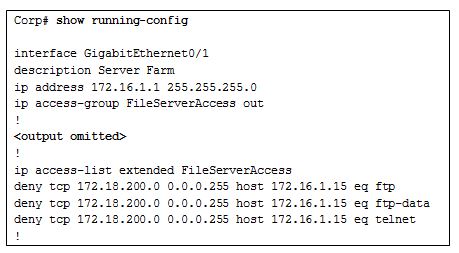Question:
Refer to the exhibit. A new network policy requires an ACL denying FTP and Telnet access to a Corp file server from all interns. The address of the file server is 172.16.1.15 and all interns are assigned addresses in the 172.18.200.0/24 network. After implementing the ACL, no one in the Corp network can access any of the servers. What is the problem?

- Inbound ACLs must be routed before they are processed.
- The ACL is implicitly denying access to all the servers.
- Named ACLs require the use of port numbers.
- The ACL is applied to the interface using the wrong direction.
Explanation: Both named and numbered ACLs have an implicit deny ACE at the end of the list. This implicit deny blocks all traffic.
Exam with this question: CCNA 3 v7 Modules 3 – 5 Exam Answers
Please login or Register to submit your answer
